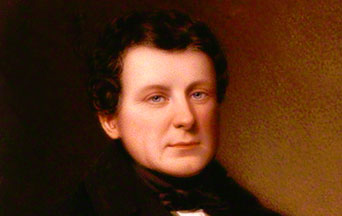
In 1823, the cardinals gathered to elect Pius VII’s successor. They were divided into two main currents. The conservative “zealots” bore this name that indicated their orientation. The “moderates” supported Ercole Cardinal Consalvi’s less stringent positions. In addition to these traditional groups, Austrian Prince and Diplomat Klemens von Metternich tried to organize a “party of crowns” with cardinals from Austria, France, Spain, Naples and Sardinia. His goal was to elect a pope who would continue the policy of Cardinal Consalvi, who had served as Pius VII’s Secretary of State or at least prevent a “zealot” from ascending the pontifical throne.
The Austrian’s intervention was counterproductive. The great majority of the conclave opposed Cardinal Consalvi. Faced with this intrusion by the civil power, those still hesitating abandoned the “moderates.” Despite the skills of Alessandro Cardinal Albani, Metternich’s spokesman, the “crowns” only obtained six votes in the first ballot. On the sixth ballot, Antonio Gabriele Cardinal Severoli, the “zealous’s” candidate, achieved a majority with 27 votes. He was only six votes short of being elected, but Cardinal Albani vetoed his candidacy on behalf of Austria.
Surprised and outraged, both the undecided and the “zealous” closed ranks. To avoid another veto, they quickly elected the name Severoli had indicated: Gabriele Cardinal Della Genga Sermattei, who ascended the pontifical throne under the name of Leo XII.
The new pope faced the deadlocked English question. On the advice of Cardinal Consalvi, the government suspended talks on the Emancipation Bill in 1816. The Irish movement for Church freedom was repressed, and the issue was discussed only as a matter of historical interest.
Clearly disapproving of Cardinal Consalvi’s policy, one of Leo XII’s first acts was removing him from the Secretariat of State. The new pontiff appointed Giulio Maria Cardinal della Somaglia to replace Consalvi.
Eternal and Natural Law: The Foundation of Morals and Law
This act improved the Irish position. Its Catholic movement had such deep roots that this change gave it new impetus, and it soon regained its former strength. Without delay, the Irish politician Daniel O’Connell reopened the long-closed Catholic Association. In a short time, its parish committees covered the entire country. O’Connell’s principle was not to spill a single drop of blood and respect all of England’s laws. Nonetheless, the passionate leader wrote brochures, promoted rallies, and used every legal means to annoy the English government. Ireland responded to his appeal and rose once again for the freedom of the Church.
All European liberals and revolutionaries disliked O’Connell’s distinctly Catholic character. His immense efforts were viewed as strange to Catholics on the European continent. Political leaders of various countries tried to suppress knowledge of this effort. Only the well-informed followed the development of this prodigious struggle. Victor Cousin’s words to Montalembert, who vibrated with enthusiasm for O’Connell, are telltale: “Ireland’s people are alien to the European movement, a little animal whose size we need to magnify with a lens to get something out of it. Like the Poles, the Irish are unworthy of freedom because they once were slaves. Believe me. People always deserve the luck they get.”
Despite this campaign of silence and the English government’s overbearing attitude, O’Connell forced England to face the Catholic problem again. The Whigs saw the Irish movement as a weapon against the government and supported it. This backing forced Tory Prime Minister George Canning to resume discussion of the Emancipation Bill in 1827. However, Canning’s death that August prevented the bill from being presented to the House of Commons.
 Learn All About the Prophecies of Our Lady of Good Success About Our Times
Learn All About the Prophecies of Our Lady of Good Success About Our Times
In 1828, O’Connell stood for parliament as a candidate for County Clarke even though, as a Catholic, he was ineligible. In ten days, the Irish raised an enormous sum of money from their own meager savings to finance his campaign. O’Connell’s rallies were great events that drew as many as two hundred thousand listeners. He won by an overwhelming vote, and his election was greeted with immense enthusiasm throughout Ireland.
Defying all rules and customs, “papist” O’Connell went to London to take his seat as a Member of Parliament. Since his voting record was unparalleled in English history, the government found it embarrassing to refuse him his office. In his speech from the throne on February 6, 1829, George IV announced that the Emancipation Bill would soon be presented to parliament. It was approved on April 13, enshrining the complete victory of the Irish. The government set aside its earlier conditions, requiring Catholics to make a simple oath of civil obedience. The new law also granted Catholics equal political rights and, with few exceptions, the possibility of holding all public offices.
O’Connell commented on this result: “April 13, 1829, has marked one of the greatest victories that history can remember—an unbloody victory, far richer in consequence than all other political commotions. Indeed, Ireland has shown Europe how much a genuinely Catholic movement can do and set an example for all the ultramontane campaigns of the nineteenth century.”
Having obtained Ireland’s political rights, O’Connell could take his seat in parliament and speak to England and the world on behalf of Irish Catholicism. His undeniable prestige earned him the title of the “Beggar King” of Ireland, which people called him for the rest of his life. As the undisputed leader of Ireland, he was, as it were, its king and a beggar for having obtained this kingship by asking his companions to help him in his campaign. The Irish had fully assisted him materially—with the small coins they took from their poverty to help liberate the Church—and morally, with their massive and unfailing support.

